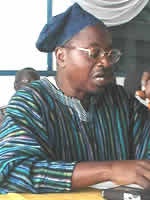By now it should have dawned on Prof. Wayo Seini that, the opportunity cost of his relinquishing his Tamale Central seat is the real cost of the $20,000 loan he would have to pay up, (not to forget of other incentives), if he fails to reclaim his seat.
Dr. Wayo was among the 230 MPs who received the $20,000 loan to purchase four-wheel vehicles for their official use as members of parliament. Having quit parliament before the four year tenure ends in 2008, Prof. Seini is in danger of being asked to cough out the taxpayer's $20, 000, unless government decides to write it off.
One other debt Prof. Seini is faced with is the 1.5 billion cedi court fine imposed on him and two others by an Accra High in 2004. This means Prof. Seini has 500 million cedis as his share of the penalty to pay. The court had fined the three defendants, including Prof. Seini for alleging that the then minister of interior, Alhaji Malik Alhassan Yakubu, General Joshua Hamidu and Major Sulemana masterminded the killing of the late Ya-Naa and 40 others in 2002 a year after the NPP- government assumed office.
The complainants had taken Prof. Seini to court to clear their names. So sure was Prof. Seini about the involvement of the three in that dastardly act that, he quit the NPP and joined the National Democratic Congress (NDC). Prof. Seini's failure to substantiate his allegations against the three, attracted the court fine of 1.5 billion ( 500 million for each ), which has been hanging over his neck like the Sword of Damocles.
One theory suggests that Dr. Seini must have been blackmailed by his debtors to resign from the NDC, so his debt could be forgiven. The signs are clear on the wall-that is if he fails to win the seat, either on the ticket of the NPP or as an independent candidate, Prof. Sieni may have to find money somewhere to pay the taxpayer's $20,000 loan. He is really in fight for his life.
Meanwhile, Members of Parliament of the National Democratic Congress (NDC) are putting on a brave face in the face of the mass resignations that have hit the party after its ill-fated Koforidua congress in December last year.
On Wednesday, the MPs parried away suggestions that more NDC MPs could be resigning from the party in the coming days, following Prof. Seini's resignation, citing lack of internal democracy.
In a statement, the NDC MPs referred to the resignation of Professor Alhassan Wayo Seini from the NDC and said the party's Northern Region Parliamentary Caucus found it to be "untimely and ill-considered."
"While the caucus considers the action of Prof. Wayo Seini as highly regrettable, his acrobatic defection from the NDC back to the NPP makes him unreliable, faint-hearted and politically intolerant.
The NDC MPs said they were fully aware of the outcome of the party's Congress in Koforidua in December last year and subsequent events and urged members, supporters, sympathisers and financiers to remain calm, united and confident in the strength, vitality and success of the Party.
The Economist Intelligence Unit (EIU) 2006 forecast for Ghana, said "in comparison with the NPP, the opposition NDC is in more precarious position in terms of its popularity. Divisions in the party appear to be deepening over its association with Jerry Rawlings. A number of senior party officials who do not support Rawlings left the party, and allegations that they were assaulted at a national party congress will further convince others that Mr. Rawlings' influence on the party is not a positive one."
According to the EIU report, the NDC is 'likely to intensify its strategy of deflecting attention away from its own weaknesses by attacking the NPP on as many issues as possible. Chief among these are, its poor economic management record and corruption allegations."
The EIU also noted that though the NDC may succeed in discrediting the NPP to some extent, at the same time, if the NPP succeeds in obtaining the vote for Ghanaians in the diaspora, this could increase its support base, while if the NDC's internal divisions deepen further, it will begin to shed support. "Should this happen, it raises the concern that the NDC, and in particular Mr. Rawlings, will react to the down turn in the party's fortunes by adopting more ruthless tactics."
"There are clear factions within the NDC that do not support the use of violence or other underhand tactics. Moreover, in the current political climate there is little appetite among the Ghanaian electorate for any party that is seen to be undermining the country's generally peaceful atmosphere, and therefore any violence on behalf of the NDC may only serve to alienate crucial swing voters' the EIU points out.
General News of Tuesday, 21 March 2006
Source: Public Agenda
Who Pays Dr Wayo Seini's Debts?

















